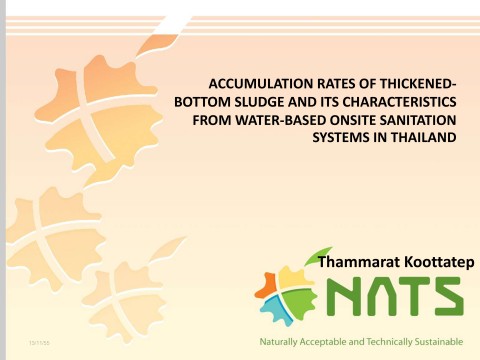Sustainable decentralized wastewater management in developing countries: design, operation, and monitoring Various documents on results from research grant Koottatep, T. (2013)
This library entry contains background documents for a grant that Thammarat Koottatep is leading and which is funded by the Bill and Melinda Gates Foundation.
Further information and a discussion is available on the SuSanA discussion Forum, see link below.
Short description of the project:
The project seeks to reinvent technologies for decentralized wastewater management that is Naturally Acceptable and Technological Sustainable (NATS). The project focuses on innovation in decentralized systems and technologies using a market-led approach for full or partial treatment and disposal of human excreta and wastewater from dwellings and businesses.
Goal:
The ultimate goal is to use a market-driven research approach to catalyze commercialization of a novel and innovative decentralized system to radically improve sanitation for the urban poor. The goals are anchored by scientific, technical and market evidence.
To create sustainable and scalable social impact, the developed system is envisaged to be:
(i) Novel
(ii) Decentralized
(iii) Viable
(iv) Sustainable
(v) Superior
Approach:
The project follows a Market-Driven Approach with the first two phases focusing on creating innovative platforms and its design and implementation, while the third and final phase concentrates on commercialization and communication.
Objectives:
1. Invention and prototyping of Decentralized Wastewater Treatment Systems (DEWATS) technology that treats and discharges a pathogen-free domestic effluent, and ready for reuse products.
2. Field testing of prototype technologies for single families and apartment blocks or for community wastewater management.
3. Securing commercial ventures with industries for mass production and commercialization.
4. Increase regional academic expertise in innovative DEWATS technologies.
Phases: The first phase is aimed at creating a platform for innovation with focus on generating ideas, screening them and then developing and testing the concept. The second phase is focused on design and development of lead options. This includes developing a marketing strategy, analysis of business model and product development. The project culmination will commercialize the lead options.
Targets: The project has quantifiable targets, which includes among others development of thermal septic tank, microwave and microbial fuel cell, nano-disinfection and solid-liquid separation devices. Besides, technology identification of odor-free and pathogen-free effluent, with a 50 per cent reduction of fecal sludge, and production of ready-to-reuse market-friendly products is the other main target. Other targets include peer-reviewed publications, and identification of market factor, market and technology landscape analysis, identification of target buys, analysis of unmet needs and compilation of dataset of performance of existing systems.
Research or implementation partners:
- Thammasat University,
- Ho Chi Minh City University of Technology,
- Ramkhamhaeng University
Authors:
Koottatep, T., Surinkul, N., Panuvatvanic, A.
Start and end date: September 2011 – October 2016
+++++++++++
Documents available for download below:
1 - Accumulation rates of thickened bottom sludge and its characteristics from water based onsite sanitation systems in Thailand (paper at FSM2 Conference in Durban, South Africa, Oct. 2012)
2 - Accumulation rates of thickened bottom sludge and its characteristics from water based onsite sanitation systems in Thailand (presentation at FSM2 Conference in Durban, South Africa, Oct. 2012)
3 - Project brochure (2012)
Bibliographic information
Koottatep, T. (2013). Sustainable decentralized wastewater management in developing countries: design, operation, and monitoring Various documents on results from research grant Asian Institute of Technology, Pathumthani, Thailand
Filter / Tags
Biogas systems Faecal sludge treatment processesFundamental research and engineeringEnglish
External links
Further information on discussion forum
Downloads
1 - Accumulation rates of thickened bottom sludge and its characteristics from water based onsite sanitation systems in Thailand
Type: application/pdf
Size: 0.66 MB
2 - Accumulation rates of thickened bottom sludge and its characteristics from water based onsite sanitation systems in Thailand (Presentation)
Type: application/pdf
Size: 1.88 MB
3 - Project brochure (2012)
Type: application/pdf
Size: 0.39 MB

